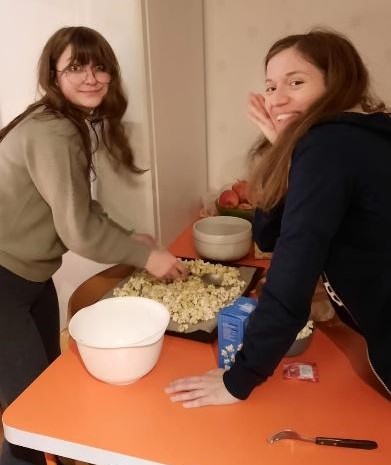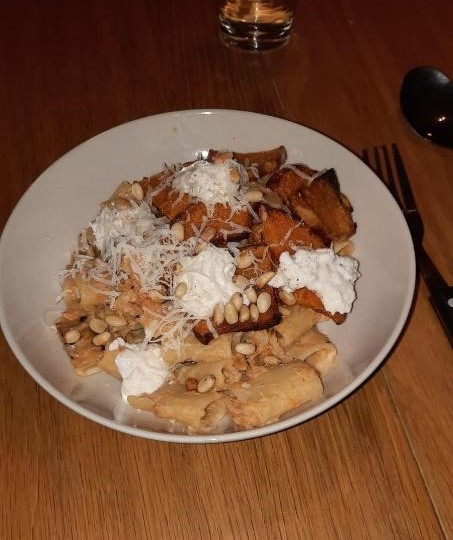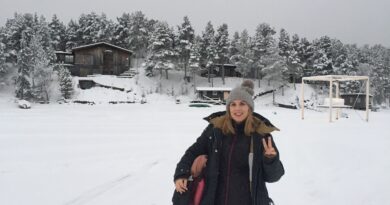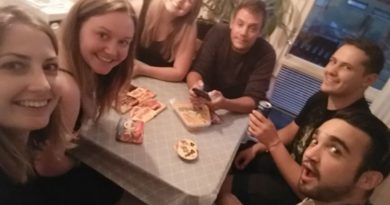Food and cooking during ESC
How to manage recipes, time and budget while living abroad?
‘Eat healthy!’ they say, ‘Cook at home!’ they say, ‘Don’t just live off of instant Ramen and frozen Pizza!’ they say. And all of this is easily said but certainly not as easily done (as all of us who lived apart from our parents for at least a while are aware). Challenges like food prices, work-time, flat mates or just intimidation can quickly hinder motivation and enjoyment of cooking. But with just a little knowledge, planning, tips and tricks it is certainly possible to eat fast, homemade meals on a budget.
Me and my situation
My name is Frieda, I’m 18 years old, I’m from Germany and I like to cook. I‘m in Växjö, Sweden on an ESC project at the moment working in a NGO bringing inclusion of people with special needs and disabilities forward. As I’m fresh out of high school this is my first experience living apart from my family. Now I’m living with 3,5 other ESC volunteers (Sarah, Anna-Lena, Andy and Isabelle on the weekends as she lives in another flat) and one university student in a house. So definitely a change of scenery.

When arriving in Sweden a couple months ago one of the first questions that came up was food. Obviously. When everyone is exhausted by plane flights or train rides, arriving at late afternoon in a completely new city, country and environment, meeting people you’ve probably never met before, getting to know each other and feeling comforted over a nice cozy meal works magic. But who cooks and how to split the costs?
For us it became pretty clear pretty early on that we didn’t want to cook separately. It seemed like a waste to each only have one shelve in the pantry and fridge, buy basically the same things, cook one person meals each evening and have to wait an hour until the stove is free. So, we decided to make meals together, have a common pantry and share our food. Another significant factor was that some people enjoy cooking (me), some didn’t as much (Sarah and Andy) and to be truthful some didn’t have as much experience and skill yet (Anna-Lena). Thus, we started cooking together.

I mostly am in charge of recipes and then we all make the meal together. Sometimes I also cook alone if it’s something easy and low maintenance. After some weeks Andy decided to cook on her own, but Anna-Lena, Sarah and I still share. When Isabelle is coming over, she joins in and especially when coming home late after language courses or on special occasions Andy still eats with us as well.
It is a very good system for us, we have enough pans and pots, no stress in the kitchen about who cooks when and who takes how long. But in the end every group of volunteers or flat mates in general has to decide and figure that out on their own. As we are basically our own little family it isn’t strange for us to cook and eat together as well. But if you aren’t as close to your flat mates or you have different diets (like vegan or gluten free) it is also fine to cook on your own and sometimes that is more relaxed than cooking for four.
Tips and Tricks
But no matter if you are cooking on your own or in a group there are some tips and tricks that can help. First a few organizational ones:
- Communication
Talk about your expectations and wishes with your flat mates. Make a clear decision about your status. If you cook together talk about your food preferences, allergies or things you don’t like. If you don’t share food and you have problems with kitchen usage time maybe do a use-schedule. Make sure to know if there are common things like oil or spices.
2. Bill Splitting Apps
This is especially useful if you buy your groceries for a group. To make sure all the bills are evenly split and not be confused about math and who owes what to whom there are bill splitting apps that do the job for you. We use Tricount and it works fine but there are dozens to choose from. Even if you don’t cook together things like toilet paper, dishwasher tabs or cleaning products have to be paid by the whole flat as well.
Now to the actual cooking ones:
3. Groceries in your Country/City
Inform yourself about grocery shopping in your ESC country. Which products are cheaper which a little more expensive? You can plan accordingly to your budget. Also find out which shops are good for what kind of products. Which grocery shops have higher prices and which are okay? Are there Asia or Oriental shops in your area that carry specific ingredients? Is there stuff that is hard to get in general? All that is very useful information that is worth keeping in mind.

4. Managing Recipes
Have at least a handful of meals that you can easily make, that are low effort and low time. Find a place to look for new inspiration. That could be cook books, YouTube, other social media or blogs. I would recommend to find a few good ones that align with your tastes and budget. You can check every few weeks for new recipes. Save them or write them down if you find meals you all (or just you) enjoy. You forget so easily about it otherwise. And as a little head start for your ESC experience, I am going to share a few of my favorite recipes as my next blogpost.
5. Meal Plans
It sounds tedious but it is actually quite helpful. For the sake of knowing what to buy at the super market, to avoid the overwhelming question of ‘What could I possibly make today?’ and to look back and have inspiration for another week of cooking in the future it is quite useful to have a week-at-a-glance list of your meals. You can plan ahead and try to use the same ingredients in different meals. Like this you save money and energy.

But the most important thing is that you don’t lose the enjoyment for cooking. While it most definitely can be a chore sometimes it is also amazing to create a meal completely from scratch and savor it together with your friends. So just do what feels right for you and make sure to not take on too much. Cooking, after all, means something different for everyone and there is hardly a right or wrong way of incorporating that into your ESC experience.
————————————————————————————————————————
This is me:
I’m Frieda, 18 years old and I’m from Leipzig, Germany. I am ESC volunteer at Funkibator in the city of Växjö in Sweden from September 2021 to June 2022.




